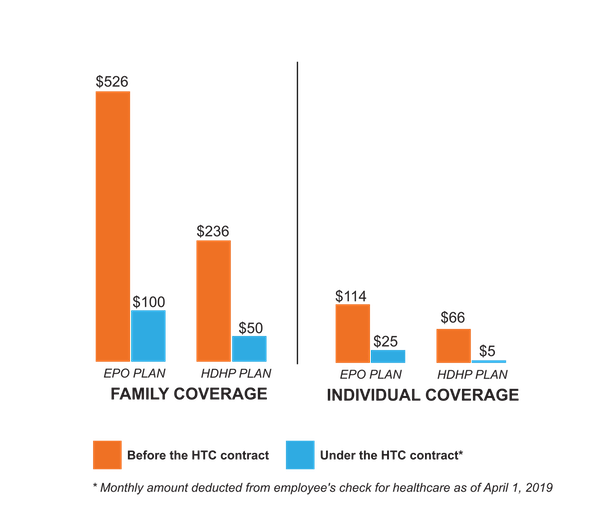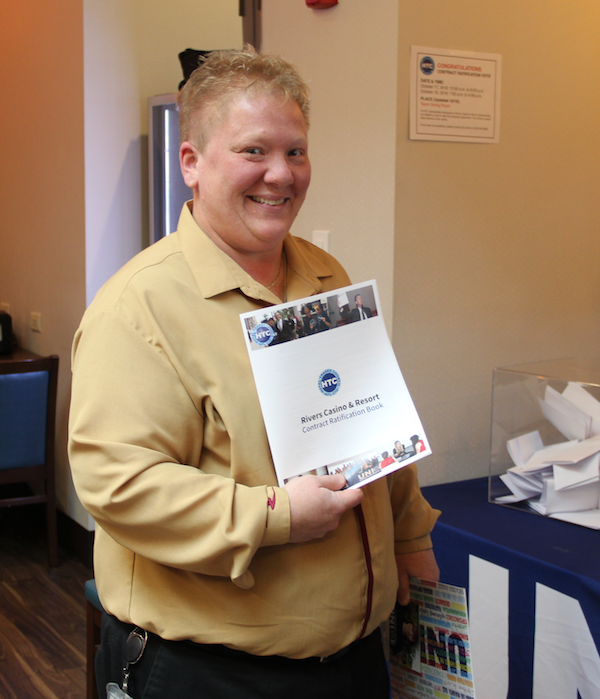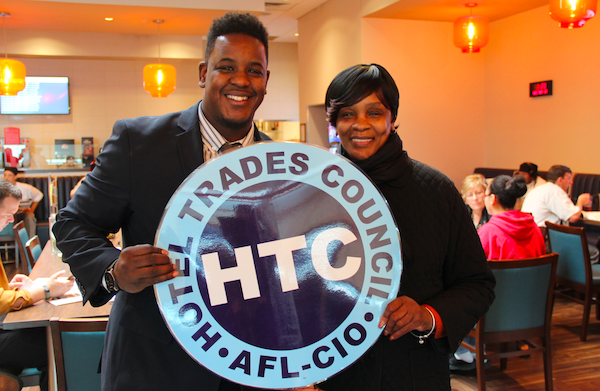A Game-Changer: The HTC Contract At Rivers Casino

HTC Executive Vice President and General Counsel Rich Maroko, chief negotiator of the Rivers contract
The newly signed first union contract between HTC and Rivers Casino & Resort is a game-changer for 800 workers and their families. It will significantly improve their standard of living and their lives at work and vastly multiply their legal rights. Here are a few examples:
Big raises
Under the new contract, union-represented employees will see their wages immediately increase by an average of 20% (retroactive to June 1, 2018) and will receive another wage increase in just six months.
Healthcare becomes affordable
Employees will also now be able to afford healthcare for themselves and their families. Prior to unionization, the casino offered two different health plans, the higher cost “EPO Plan” and the lower cost “HDHP Plan,” but employees were required to pay very high contributions out of their paychecks and more than 60% of the employees simply did not enroll in either health plan.
The new HTC contract tremendously reduces the monthly contributions employees pay out of their pockets for health care, as the following table demonstrates:

Pension benefit established
The new union contract at Rivers establishes an employer-funded pension benefit for HTC-represented employees, starting in 2020. As everyone knows in this era, it is virtually unheard of for employers to agree to establish a new pension benefit for employees, preferring instead to offer workers much cheaper and woefully inadequate 401K plans. 401K plans are mainly funded out of the pockets of the employees themselves.
Unlike a 401K plan, the new pension benefit ensures that vested employees at Rivers will receive a monthly check when they retire for a defined amount, based on their years of service, for the rest of their lives.
The new contract also guarantees that, in addition to the pension, employees will keep the 401K plan which was already in effect, and that they can also enroll in an additional 401K plan administered by the industry under the terms of HTC’s Greater Regional Industry-Wide Agreement (“GRIWA”).
More paid time off
As of January 1, 2019, the new HTC contract gives employees 4 more PTO days per year. This represents a significant increase in their paid time off. For example, before the contract, employees with less than 1 year of service accrued PTO days at a rate of 15 days per year. As of January 1, their PTO accrual rate will increase to 19 days. The contract increases the accrual rate for employees with 2 years of service from 16 days per year to 20, etc..

Rivers Business Agent Nancy Hull explaining the contract
Overtime – better than what the law provides
The law only requires employers to pay employees overtime pay if they work more than 40 hours in a work week. However this new contract at Rivers greatly multiplies the legal rights of employees, and one example of that is how overtime will work going forward.
Under the new HTC contract, Rivers workers are entitled to time and a half overtime premium pay when they work more than 8 hours in any day, or if they work 6 or 7 days in a row, even if they don’t work more than 40 hours in a work week.
This means that if an employee has to work 9 or 10 hours one day, the employer cannot avoid paying time and a half by sending the worker home early on another less busy day in the same week.
Because casinos and hotels operate all week, workers’ days off sometimes change and when that happens, they often end up working 6 or 7 days in a row across two pay periods, but only 5 days in each pay period. Under the law, when that happens, they don’t get time and a half, but under the new HTC contract, the workers at Rivers will.
Part-time premium pay and night shift differential Employees who work less than a full work week (i.e., 40 hours) will be paid an additional 50¢ per hour if they are in a non-tipped job, or 25¢ per hour if in a tipped job.
Under the terms of the agreement, these premiums will rise proportionately in the future with annual wage increases. This premium pay incentivizes the Employer to offer employees full-time work and compensates employees who are part-time. Effective April 1, 2019, employees will be paid an additional 67¢ per hour for any and all hours worked between 11:00 PM and 7:00 AM.
Fair scheduling rights
Non-union workers in the gaming and hospitality industry are notoriously subjected to unfair scheduling practices which often make it difficult for them to spend time with their families or make plans in their personal lives. Days off and shifts are frequently changed arbitrarily because of poor management or favoritism.
However, under the new HTC union contract, Rivers employees now have powerful rights regarding scheduling. Management must post work schedules at least 5 days prior to the beginning of the work week. Schedules are offered by seniority, not favoritism. Except under very limited circumstances, the schedule cannot be changed after it is posted and even then, management is prohibited from making any changes to the schedule that are abusive to the rights of employees or designed to deprive employees of benefits, and that right is enforceable through the contract’s excellent and impartial grievance and arbitration process.
Another common abuse in the industry occurs when employers decide, if business is unexpectedly slow, to send employees home, without pay, after they have reported for work. The new union contract requires the employer to offer employees a full scheduled day of work if they’re called in to work.

Heat Supervisor Margarita Vargas explaining the contract to workers and answering their questions
Job Security
Most people know that non-union workers in the United States are “employees at will,” meaning that their employers have the legal right to fire them on a whim, for a bad reason, and even for no reason. And most people know that almost all unionized workers have powerful contractual rights protecting them against unjust discharge or discipline.
But the new HTC contract at Rivers not only provides those protections to employees – it provides other vital job security protections that most workers would not even dream of asking for.
For example, the Rivers contract protects the jobs, wages, benefits, and work rights of HTC-represented employees at Rivers even if the casino/resort is sold or changes management company. The Rivers contract contains a “successorship clause” requiring any new owner or management to keep the existing employees and to assume all the obligations under the contract.
How many Americans have lost their job to outsourcing/subcontracting? Too many to count. But the union contract at Rivers prohibits the employer from subcontracting any jobs that were not already subcontracted before HTC organized the shop.

Table Games Dealer Cari Catucci
Guaranteed “toke rate” for Dealers and Slot Attendants
Dealers and Slot Attendants now have a contractual minimum “toke rate,” which requires the employer to guarantee them a minimum average hourly tip income each week in addition to their wages.
Scholarship fund
The new agreement requires Rivers to contribute to the Industry-Wide Agreement Scholarship Fund, which provides college scholarships to employees’ children.
Licenses and related training
The new contract at Rivers requires the employer to pay for the cost of any and all licenses employees are required to obtain in the course of their regular job duties. If an employee needs to take a class or attend similar meetings in order to maintain his/her license(s), the time spent doing so will be considered paid working time, with tipped employees paid at the benefit day rate for such time.
Training time for Dealers to learn additional games will also be considered paid working time.
Also, the employer must negotiate with the Union to establish extra pay for additional required licenses and/or duties, including, but not limited to, key copying, HVAC duties, and electrician certification.
Safety and health
Worker safety laws in our country are weak and getting weaker. OSHA, the government agency that is supposed to enforce those weak laws, is slow, underfunded and ineffective.
Like all HTC contracts, this one at Rivers provides real health and safety protection for the workers and a fast and effective enforcement mechanism.
For example, the contract explicitly gives employees the right to refuse a work assignment if they reasonably believe it would expose them to unusually dangerous conditions. That’s a basic right the law does not offer.
Also, no later than April 1, 2019, any employee who is required to enter an occupied guest room must be provided with a panic button that they can quickly and easily activate to summon help.

Durpatie Rupnarain, EVS Attendant
Employee privacy
Employees have extensive privacy protections under the contract. The Employer must respect the employees’ right to privacy and cannot divulge any data or information regarding an employee (including Social Security Number, address, or phone number) except under very limited circumstances.
Management is further prohibited (except if mandated by law) from requiring any non-probationary employee to submit to a drug test, background or credit check, and no employee may be required to submit to a lie detector test. Again, these rights can be enforced effectively and quickly.
No discrimination
This provision ensures that no employee is discriminated against in the work place based on his/her gender, age, race, creed, color, religion, national origin, citizenship, marital or parental status, sexual orientation, gender identity or expression, personal political beliefs or associations, immigration status, lawful off-duty activity, disability, veteran status, membership in the Union or participation in protected concerted activity or any other trait protected under either federal, state or local law.
This means the contract provides an additional, quicker and more reliable method of enforcing these rights in addition to any offered by law.
Dignity and respect
The foremost right of all Union-represented employees is the right to be treated with dignity and respect at work. This article specifically prohibits managerial harassment and abuse of employees in any way and, in conjunction with our grievance and arbitration process, these rights can be reliably enforced.

Director of Organizing Julia Rybak buttons up Cook Luis Torres
Voting time and voter registration
For political advantage, public officials in many states, counties, towns and cities deliberately impose obstacles and inconveniences on citizens trying to exercise their right and duty to vote. This is a major reason voter turnout in most elections is scandalously low in our country.
Our contract pushes against that trend by giving employees the right to leave work for up to 4 hours and go vote in any local, state, or federal election during paid working time. They can exercise this privilege up to 3 times a year (to cover primary, general, and special elections).
For tipped employees, such time shall be paid at the benefit day rate. Employees must provide reasonable notice of their intent to use paid voting time and the Employer must accommodate such request, unless it will cause undue disruption.
Furthermore, the contract requires the employer to offer new employees the opportunity to register to vote at work.
And, last but not least: NO LOSS OF WAGES OR BENEFITS
This provision guarantees that no employee will suffer a loss of wages, hours, benefits, or any other term or condition of employment as a result of the contract.
In other words, in addition to all the improvements the union contract gives employees in higher wages, better benefits, job security, fair treatment, and rights on the job, the contract now also guarantees any single fringe benefit, higher wage, or perk they were offered (but never guaranteed) by the employer before they were represented by HTC.

Heat Organizer Tyrone Connell with Pauline Kent, Cage Cashier


